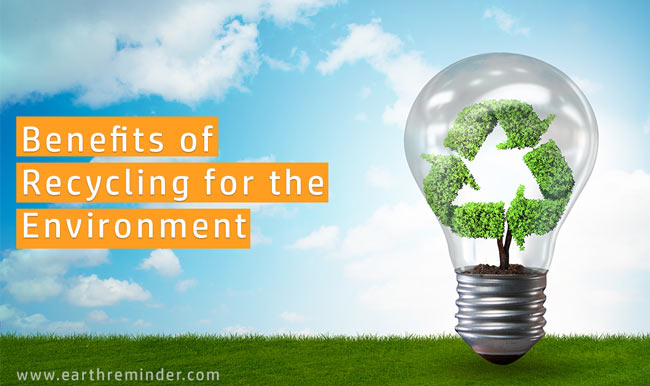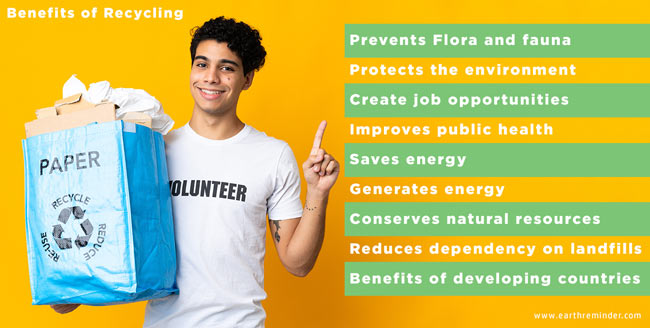Benefits of Recycling for the Environment
There are many benefits of recycling for the environment. It is one of the most efficient waste management methods. Today we have many options that make recycling easier. Before we proceed to understand the benefits, let us look at the concept first.
Table of Contents
Meaning of Recycling:
As the name suggests, recycling is the process of making useful and new products from waste materials. It is playing a crucial role in modern waste reduction today. It is a part of the three components of the waste hierarchy – the 3Rs of the environment (Reduce, Reuse, Recycle).
How is Recycling Done?
Recycling materials are also known as recyclates and include glasses, cardboard, plastics, batteries, and tires. Materials are collected from the curbside bins and then-
- segregated,
- cleaned,
- reprocessed and
- manufactured into new products
The result is that they have different designs and shapes and get a final touch.
In another sense, recycling a waste material produces a new and fresh supply of the same product. For example, new papers are produced from used ones; or used polystyrene into a new one; used canisters and metal cans into new ones over and over again.
How Does Recycling Benefit The Environment?
The benefit happens as it reduces greenhouse gas emissions and preserves materials.
It follows the WASTE-TO-ENERGY principle that reduces the consumption of fresh raw materials. This leads to a reduction in air pollution (from incineration), water pollution and soil pollution (from landfilling), and energy usage.
Also, through composting, food waste or garden waste is degraded and converted into useful manures to restore the fertility of the soil. There are so many other advantages. Let’s understand the benefit of recycling for the environment in some more detail:
Benefits of Recycling:
 Conservation of natural resources
Conservation of natural resources
We all know that our nature’s resources are finite and take thousands and millions of years to replenish. The process of recycling helps preserve our limited natural resources for us as well as for our future generations. Let’s understand this better:
- Recycling plastics means using less plastic. Hence, our total dependency is reduced on the planet’s fossil fuel reserves that take thousands of years to develop.
- Recycling paper and wood saves trees and natural forests.
- You can plant as many trees as you want, but you can’t replace the tropical rainforests and ancient woodlands. Once they are lost, their support of a wide variety of flora and fauna is gone forever.
- Recycling metals by melting and alloying reduce the risk people face while mining and extracting new metal ores.
Protects Ecosystems and Wildlife
Recycling reduces our need to extract new raw materials from Earth. Therefore, preventing us from spoiling our vanishing natural resources.
This will lessen the harmful disruption and damage being done to our ecosystem, and wildlife. As fewer forests are cut down, fewer rivers diverted and polluted, and less variety of Flora and fauna harmed or displaced; There will be less pollution to air, water, and land.
Suppose the process of recycling is not implemented with serious intentions. In that case, it will lead to a huge amount of waste generation and accumulation in rivers and soil that will adversely affect everyone.
Reduces raw materials demand
As more and more products are used, more and more waste will be produced. This leads to an ever-increasing demand for raw materials and then results in the exploitation of more resources for their production.
Such an increasing demand for raw materials displaces and exploits those living near the forests.
Recycling, in one way, is better as it helps people meet the increasing demand for new stuff as well as prevents tribal people from losing their homes. This is a significant benefit of recycling for the environment.
Saves energy
Recycling materials requires less energy than manufacturing the same products from raw materials. For example:
- Producing new aluminum from old and rusted products requires 95% less energy than manufacturing it from its ore. In making steel, around 70% of the total energy required in new steel manufacture is saved.
- Making papers from recycled paper pulp requires 12 Wh, whereas producing it from wood requires 17 Wh.
Saving energy helps us in reducing the energy crisis our generation can face in future times. It can harm our socio-economic conditions and can be very detrimental, especially to developing countries. So, recycling is the smartest choice you can adopt to treat your wastes. One of the biggest benefits of recycling to the environment is this.
Regulates carbon emissions
Since recycling uses less energy, it means that a low amount of carbon will be emitted during the process. It also reduces the amount of waste we send to landfills.
It’s good if they don’t contain harmful and toxic gases, but what if it contains methane gas or carbon dioxide gas? This will lead to a serious problem as both are greenhouse gases that contribute to global warming.
Global warming can give rise to the El Nino effect which leads to:
- A tremendous increase in Earth’s temperature
- Melting of polar ice caps.
- Depletion of the ozone layer
The most important benefit of recycling for the environment is that it will reduce disastrous climate change happening.
Employment opportunities
Although not a direct benefit of recycling for the environment but recycling helps from a business point of view too. It can help create more and more employment opportunities. The more we recycle, the more jobs will be created in recycling plants and companies.
Designing, packaging, and remanufacturing products will create more job opportunities, and it will lead to the development of our country. If you live in an area where there are piles and heaps of garbage, you can start a waste collection business.
Homeowners and several companies are willing to pay someone who can get rid of their wastes. Moreover, you can recycle garbage and make useful products, and then resell them. This will help not only in cleaning your cities but can also be a major step in restoring the greenery of our planet.
Cheaper than waste collection and disposal
In 2017, Lambeth council of London pointed out that, “the process of recycling is 6 times cheaper than the normal collections and disposal of wastes.” So, the more you recycle, and the less you throw, the more it will enhance public and social health, and the more it will keep our planet green and blue.
Conclusion of Benefits of Recycling:
The first step towards a safer environment is to use less stuff, only according to our needs, and then recycle them to minimize waste. Recycling not only saves energy, but it also promotes international socio-political peace.
In being more mindful about the benefit of recycling for the environment; One can adopt the four powerful mantras – “REDUCE, REUSE, RECYCLE, RESTORE”
Be aware of what you buy and always check whether you need such items or not. Be mindful and practical in your thinking.
If appropriately and logically implemented now, the effectiveness of this process will benefit us and our next generations.
“TOGETHER, WE CAN MAKE A HUGE DIFFERENCE”

 Conservation of natural resources
Conservation of natural resources